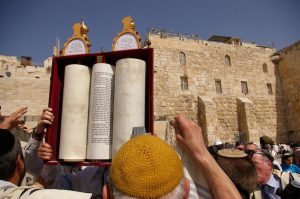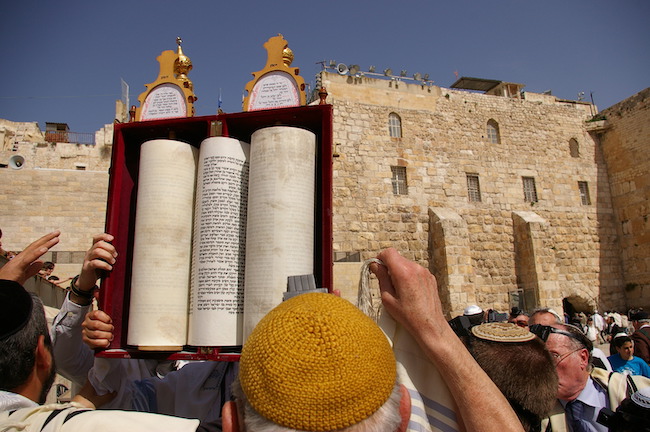
And this is the blessing with which Moshe, the man of God, blessed the Children of Israel [just] before his death. (Devarim 33:1)
AND THIS IS the teaching which Moshe set before the Children of Israel… (Devarim 4:44), 3,332 years ago. I don’t know about most people, but that kind of blows me away. The actual Sefer Torah a person reads from today may not be older than one year, but the words on it go back a long time, and the truth is, even farther back in time. According to the Midrash, Torah was with God for 2,000 years prior to Creation itself.
2,000 years before Mt. Sinai? How is that even possible?
What’s the problem? Creation was not the beginning of the story. It was the middle of it, and it was built from the Torah, which was its blueprint. Don’t be fooled by the black ink on the white parchment that may still be quite fresh. The words for which they are a base are as ancient as it gets, and then some.
So what? How does knowing that enhance a person’s quality of life?
Obviously, it doesn’t for many people, including many who actually live by Torah. It should, but it doesn’t. There are a couple of reasons why, but chief among them is probably our belief that we, at the other end of history, have become so independently smart and knowledgable that we think that we know what is best for us.
Part of the reason for this way of thinking is that Torah concluded its narrative with the death of Moshe Rabbeinu. The prophets ceased to hear from God around Mordechai’s and Esther’s time. Since then, history has been writing its own narrative, each generation as it has serendipitously lived it. Halachah obviously still addresses situations where it comes into question, but even that may have changed, as far as many are concerned, because situations have changed.
Hence all of the “interesting” variations of Torah Judaism today. For some, it’s as if the Torah only foresaw slightly into the future, and would surely “adjust” itself if it saw how the world has since evolved. They don’t subscribe to heretical views that men wrote the Torah and therefore could only address their own generations. But they seem to live with some notion that there is a gap between what the Torah prescribes and what much later generations require to “uphold” it.
What people do not realize or think about very much is how their system exists within the Torah’s system, not the other way around. It is the “chicken,” and we are its “egg,” and no matter how modern we may become, we can never become anything beyond what the Torah has made possible. As Ben Bag Bag has said in Pirkei Avos: everything is inside of it…even that which can’t be seen from the simple reading of its words.
Furthermore, it was given to us by Moshe Rabbeinu, the greatest prophet to have ever lived. PROPHET. We may be smart and savvy, but that is nothing compared to being an actual prophet. We can build the future, but a prophet already knows it. We build it from what we learn and understand, which can be wrong. A prophet gets his information from God Himself, the One Who not only created everything, but continues to do so even in modern times.
In fact, anything that exists today, or will ever exist, can be traced back to something in the Torah. Just like any invention has a history of physical development, it also has a history of conceptual development. And if you continue back far enough, you will end up somewhere in the Torah that is the spiritual “root” of it. You just have to know how to look, in order to know where to look.
One example that I have used repeatedly is the Internet. For so many reasons it can be traced back to the Aitz HaDa’as Tov v’Ra, the Tree of Knowledge of Good and Evil. World Wars can be connected to Kayin’s murder of his brother Hevel. There are many examples, some more incredible than others.
But can it be any other way? According to the Vilna Gaon, every event that has ever occurred, is occurring, or will ever occur, can be traced back to something that happened during the six days of Creation. Even the exact arrival date of Moshiach can be calculated if one knows how to open up the verses to reveal such secrets.
True, the knowledge to physically actualize concepts has to be accumulated over time. But not the spiritual knowledge that gives rise to them. That is godly wisdom that was even better understood by earlier generations, not by the later ones. The average scientists and technologists are really only interested in harnessing the power of Creation to make life more comfortable. The meaning about life to which they allude is not a priority, if they even believe it exists.
Take the test. When you hear the word “Physics,” what do you think about?” Genius. Modern. Capable. Exciting. Reality. Truth. Future, etc. When you hear the word “Bible,” what comes to your mind? Ancient. Limiting. Out-of-step. Mistaken beliefs. Sacrifice, etc. And people wonder why religion struggles to survive?
Funny how, for a secular person, that is what comes to mind. Ironic how, when that secular person does teshuvah and learns Torah, they change it all around. They come to understand how all of it is really reversed, that Torah has the real genius, and that the non-Torah has missed the mark with its way of thinking. They come to realize that “ancient” Torah is all-encompassing as it gets, and has built into to the conceptual basis for every society, no matter how advanced.
And that’s before even looking at Kabbalah. Learning that reveals secrets about Creation that could only have been told by God Himself, and which make all other realities seem, well, a lot more trivial. Society may pour a lot of time, energy, and resources into making and improving the modern world, but in the end, will it have been worth of all that if it never really brought people to the proper “finish line”?
In a couple of days, God willing, it will be Simchas Torah. Unfortunately, the virus has made sure that we will not be able to celebrate the day as joyously in the past, with the masks and social distancing. Many people won’t even go to shul, and those who do will be very limited in how they interact with the Torah and their co-celebrators. It is really quite tragic.
But sometimes “tragic” is good. We should never need this type of “good,” but obviously God feels that we do now. We have been in need of change to our Torah perspective for some time now, but haven’t really made it. So, it is being imposed upon us from Above. God’s not saying, “Don’t celebrate Simchas Torah.” He’s saying, “Don’t celebrate it the way you have until now. This year, do it differently.”
Besides how we dance with the Sefer Torah, what should we change? What should we think about? What should we do differently than we have in the past?
For starters, we should consider the first verse of the last parsha of the year.
And this is the blessing with which Moshe, the man of God, blessed the Children of Israel [just] before his death. (Devarim 33:1)
Now, it is certainly talking about the blessings that Moshe Rabbeinu will give to the tribes before he dies. But before it gets there, it is talking about the Torah itself. Torah is the blessing with which Moshe, the man of God, blessed the Jewish people. That is, only the one he gave us is the source of our blessing, not any variation of it that might follow it. Change HIS Torah, and you lose the blessing.
“Me? Change the Torah?” you might be objecting to yourself, “God forbid!”
But the truth is, every time we let a personal whim adjust the Torah that Moshe Rabbeinu gave, and the Chachamim of earlier days interpreted, we change the Torah, and our blessing. Since the end of the Second Temple period, there really hasn’t been anyone on the appropriate level to interpret Torah as they did.
Tzaddikim?
Certainly.
Torah scholars?
Unquestionably.
But we have been in exile for thousands of years now, and the Diaspora has widened it and softened us, spiritually. As smart and clever as we have become, we still do not have the wisdom of the prophets, and certainly not of the likes of Moshe Rabbeinu. Far from it. But we can survive anyhow by living off the “blessing” that the man of God, Moshe Rabbeinu, gave to us. Taking that to heart, really taking it to heart and all that it means, should be enough make any heart celebrate and dance any time of year.
May we merit to appreciate and live by Torah as given to us by the greatest teacher to have ever lived, so that by the time Simchas Torah comes around again, we can celebrate it without any limitations. Chag Samayach.


